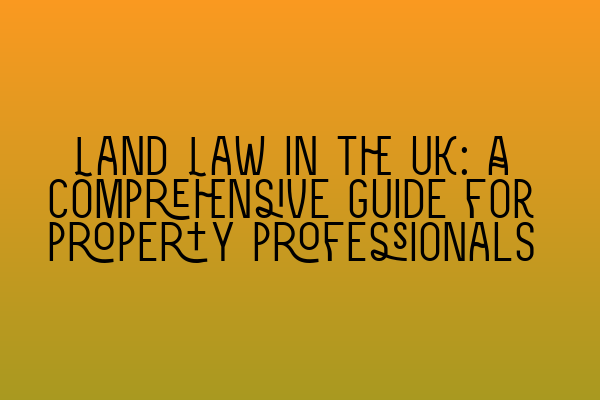Land Law in the UK: A comprehensive guide for property professionals
Introduction
Understanding land law is essential for property professionals operating in the UK. Whether you’re a solicitor, real estate agent, or property developer, a comprehensive knowledge of land law will not only help you navigate legal complexities but also enable you to provide better advice and services to your clients. In this blog post, we will delve into the key aspects of land law in the UK, providing you with a comprehensive guide to help you excel in your profession.
1. The Basics of Land Ownership
The first step in understanding land law is grasping the concept of land ownership. In the UK, land can be owned in various ways, including freehold and leasehold. Freehold ownership grants the owner absolute rights over the land, while leasehold ownership involves the ownership of a property for a fixed period, typically through a lease agreement.
2. Types of Property Interests
Property interests in the UK can range from legal estates to equitable interests. Legal estates include freehold and leasehold, while equitable interests provide individuals with certain rights, such as the right to occupy or receive income from a property. It’s important to understand these different interests when dealing with property transactions.
3. Easements and Restrictive Covenants
Easements and restrictive covenants are two crucial aspects of land law that property professionals should be familiar with. An easement grants a non-owner the right to use another person’s land for a specific purpose, such as accessing a neighboring property. On the other hand, restrictive covenants limit the use of land to ensure specific conditions are met.
4. Registered and Unregistered Land
In the UK, land can be registered with the Land Registry or remain unregistered. Registered land provides a higher level of legal certainty, as ownership and any other interests are recorded in the land register. Property professionals must understand the implications of dealing with registered and unregistered land to protect their clients’ interests.
5. Adverse Possession
Adverse possession, also known as squatter’s rights, allows an individual to claim ownership of land they have possessed for a certain period without the owner’s permission. Property professionals need to be aware of the legal implications and potential disputes that can arise from adverse possession claims.
6. Contracts and Conveyancing
Contracts and conveyancing play a crucial role in property transactions. Property professionals must comprehend the process of drafting and executing contracts, the importance of pre-contract searches, and the necessity of ensuring all necessary legal requirements are met during conveyancing.
7. Mortgages and Financing
Mortgages and financing options are often essential for property transactions. Property professionals need to be knowledgeable about mortgage laws and understand the legal implications of default and repossession. Familiarity with different financing options will enable you to provide comprehensive advice to your clients.
8. Landlord and Tenant Law
For property professionals involved in leasing or managing rental properties, understanding landlord and tenant law is paramount. From drafting tenancy agreements to resolving disputes, knowing the rights and responsibilities of both landlords and tenants will enable you to navigate these complex legal situations effectively.
Conclusion
To excel in the field of property law, professionals need a solid understanding of land law in the UK. This comprehensive guide has provided an overview of some of the key aspects of land law that property professionals should be familiar with. By continuously expanding your knowledge and staying up to date with changes in legislation, you can ensure that you provide the best possible advice and services to your clients.
To further enhance your understanding of property law and prepare for the SQE exams, check out our related articles:
– SQE 1 Practice Exam Questions
– SQE 1 Practice Mocks FLK1 FLK2
– SQE 2 Preparation Courses
– SQE 1 Preparation Courses
– SRA SQE Exam Dates
Remember, a robust knowledge of land law is the foundation for success in the property industry. Stay informed, keep learning, and thrive in your profession.
